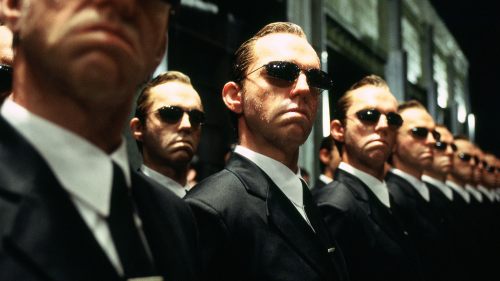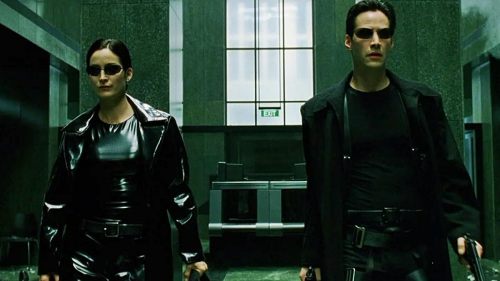THE MATRIX Trilogy’s Agent Smith: Neo’s Lost And Wicked Mirror
The Matrix Reloaded is 16 today, old enough to drive. Both it and its sequel, The Matrix Revolutions, are deeply flawed movies. I cannot deny that they stumble. More than once, their set pieces drag to the point of becoming cinematic run-on sentences. The new cast members’ good work is undercut by the sheer number of them reducing most of their characters to sketches. Most seriously, The Wachowskis’ ambitious attempt to tell the sequels’ story across multiple forms of media punched holes in the films themselves. Their story begins not with the opening shot of Reloaded, but with the animated short film Final Flight of the Osiris. The only place to find substantial portions of Reloaded’s second and third acts, as well as context for an important part of Revolutions’ first act, is the (infamously rushed) tie-in game Enter the Matrix. The result is that both pictures suffer from pronounced and frustrating narrative herky-jerkyness. Yet, while the Matrix sequels’ issues are serious, they are great films. Their action is creative, varied and often genuinely beautiful. Their story, even disjointed, is narratively and philosophically daring in a way that very few pictures of their size and scale get to be. And, thanks to Hugo Weaving’s sterling performance as Smith, they boast one of cinema’s greatest villains.
Joe Pantoliano’s Cypher played the foil to Keanu Reeves’ Neo in the first Matrix. Weaving’s then-Agent Smith served as the implacable gatekeeper Neo had to face and defeat to achieve self-actualization and become the One. Agent Smith may have despised humanity in general and Neo in particular, but his actions were always those of an enforcer. Even when operating outside the lines of ordinary Agent behavior by going on a hate-fueled rant while interrogating a captive Morpheus (Laurence Fishburne), Smith acts to perpetuate the Matrix’s status quo and seeks to destroy the human rebels because they threaten its stability. When Neo awakens as the One and destroys Smith, his victory is as much over the system Smith serves as it is Smith himself. Weaving portrays Agent-era Smith as someone whose cold, collected control is largely genuine. The moments where the hatred festering in his soul jumps from “irritated contempt” to “sadistic fury” are stress-induced lapses, rather than a mask slipping. Tellingly, whenever Agent Smith believes he has the situation in hand, Weaving emphasizes how unnervingly calm he can be. Had Neo not gotten up after being shot to death, Weaving’s performance suggests that Agent Smith would have comfortably returned to his routine after a last “Goodbye, Mr. Anderson.”
Come Reloaded and Revolutions, Smith’s role shifts, and Weaving adjusts his performance to accommodate the former Agent’s dramatic mutation. The Matrix’s Agent Smith was an obstacle. Reloaded and Revolutions upgrades Smith not only to Neo’s arch-nemesis, but to his full-blown shadow. Weaving, alongside the Wachowskis and fellow actor Ian Bliss (playing an ill-fated human rebel who Smith bodyjacks), grows the former Agent into a nightmare. As an Agent, Smith’s hatred of humanity drove him. As an independent, virus-like program, that hatred not only grows to encompass all life – human, machine and program alike – it becomes one of his defining traits, alongside his fear, his ignorance and his nihilism.
Smith and Neo share the same goal (as Smith himself says, “I want what you want.”) – an end to the system of control that defines the world. This system, which is both represented by and far bigger than the Matrix, ensnares all of life – the free humans of Zion, the humans connected to the Matrix, the programs who live within the Matrix and the machines. But in everything else, they are opposites. Smith seeks to destroy the system (and thus life) because it disgusts him. Neo seeks to end the system because it prevents anyone from being truly free. Smith claims total certainty in himself and his mission, but he is deeply disturbed by anyone or anything that challenges him. He specifically consumes the Oracle so that he can use her precognition to confirm once and for all that he is right, and even that is not enough. Neo constantly and openly questions himself. When confronted by things that upend what he knows (i.e. The Architect or the loving family of programs he meets in Revolutions), he listens and incorporates that new knowledge into his perception. He is willing to admit that he could be wrong, even when facing down the machines’ enraged and scared leader. Neo dies calmly, if not happily, and expresses empathy for Smith’s fear. Smith dies confused, terrified and whining about how unfair his death is.
Weaving performs Smith in Reloaded and Revolutions as a disturbingly childish, disturbingly clueless brute. He can put on a mask of professionalism that resembles the way he acted during his time as an Agent, but it slips very easily. For all that he claims to have achieved enlightenment and found clarity of purpose, Smith spends the sequels flailing. In Reloaded he either ignores or straight up does not realize how close he is to the source of the Matrix itself when he attacks Neo in the system’s backdoors. When he obtains a human body, he is more interested in mutilating it to “prove” that humanity is “weak” than he is in trying to understand the creatures he hates so much. In Revolutions, he throws multiple temper tantrums. When he absorbs the Oracle to both gain her powers and spite her, Weaving raises Smith’s mania to such a height that he visibly scares himself. When Neo refuses to roll over and die, Smith launches into an extended rant about how meaningless existence is that Neo successfully rebuts with one sentence. Smith can only respond by declaring that the world is his, as though he was a Bond villain on a playground. Even when his victory is apparently at hand, Smith is so lost in himself that he is audibly and visibly terrified by Neo simply standing up. Weaving’s panicked, affectation-less shout of “GET AWAY FROM ME!” to Reeves is a perfect piece of acting. It’s totally at odds with Smith’s ordinary behavior, but Weaving not only makes it sound natural, he turns it into the culmination of Smith’s character development. Smith was freed from a system he hated but refused to learn anything beyond that hatred. He crafted such a narrow view of the world that anything running counter to that view was incomprehensible, something to be destroyed lest it challenge him. And if it could not be destroyed, it was the scariest thing in the world.
In Reloaded and Revolutions, Weaving stands as a mirror to Reeves. He spirals his lost and vicious Smith into oblivion while Reeves guides his questioning, compassionate Neo into true enlightenment. It’s a terrific performance of a terrific villain, and it’s one of the best things about a pair of movies both wobbly and magnificent.



